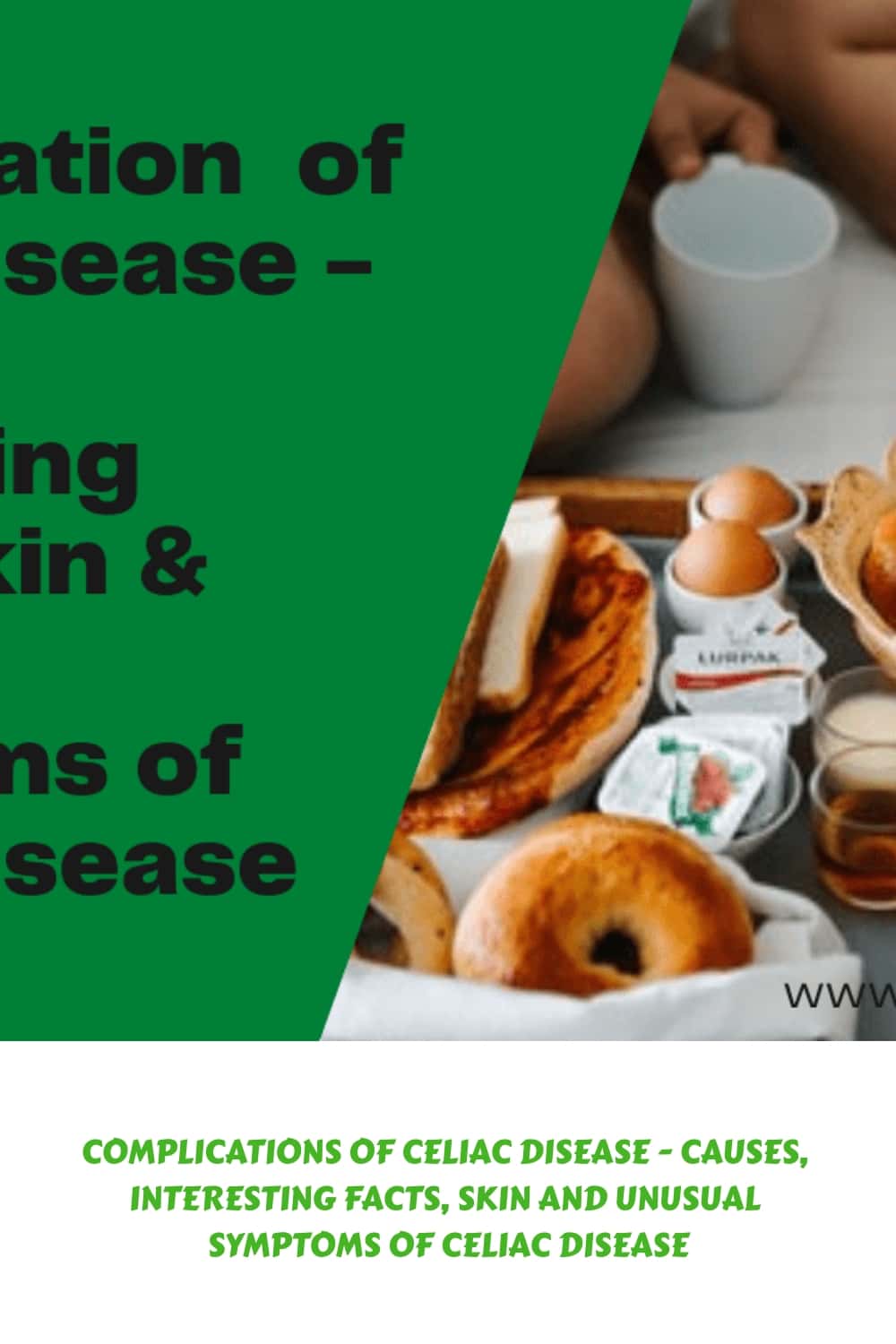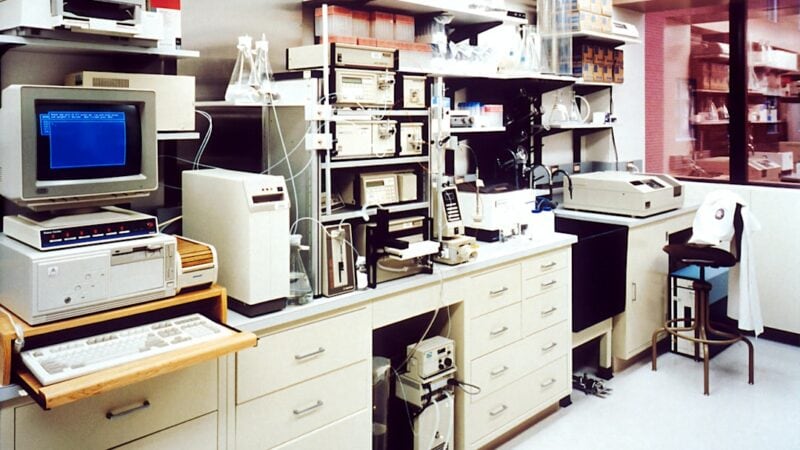Complications of Celiac Disease – Causes, Interesting Facts, Skin and Unusual Symptoms of Celiac Disease

Untreated celiac disease can cause many different symptoms and complications. We will look more in-depth at the complications of celiac disease, its symptoms, its causes, unusual and interesting facts about celiac disease. We will give you also interesting facts about celiac disease.
Celiac disease is a type of gluten intolerance. It’s a chronic disorder characterized by damage to the small intestine because of an immune reaction against the protein found in wheat, rye, and barley. There are different stages of celiac disease that we will look at, and celiac patients can learn about the most common complications, how to get diagnosed, and how to avoid these complications.
Celiac disease affects nearly 2 million Americans, and the number is growing at an alarming rate.
It is a hereditary autoimmune condition in which a person has a delayed allergic reaction to gluten (a protein that causes the dough to be sticky) found in cereals, such as wheat, barley, and rye.
Table of Contents
Causes of Celiac Disease
There are numerous celiac disease causes, but the most common cause is an inherited genetic problem with the body’s production of gluten proteins. It primarily affects the Small Intestine and may impact another digestive, nervous and immune systems.
We know by now that celiac disease is an autoimmune disease that occurs when the small intestinal mucosa of a person with celiac disease reacts to gluten. This gluten is a protein discovered in wheat and similar grains. Celiac sprue is one of the most typical diseases in young people, and scientists are still looking for the exact cause. Celiac disease goes by many names like coeliac disease, celiac sprue, and gluten-sensitive enteropathy.
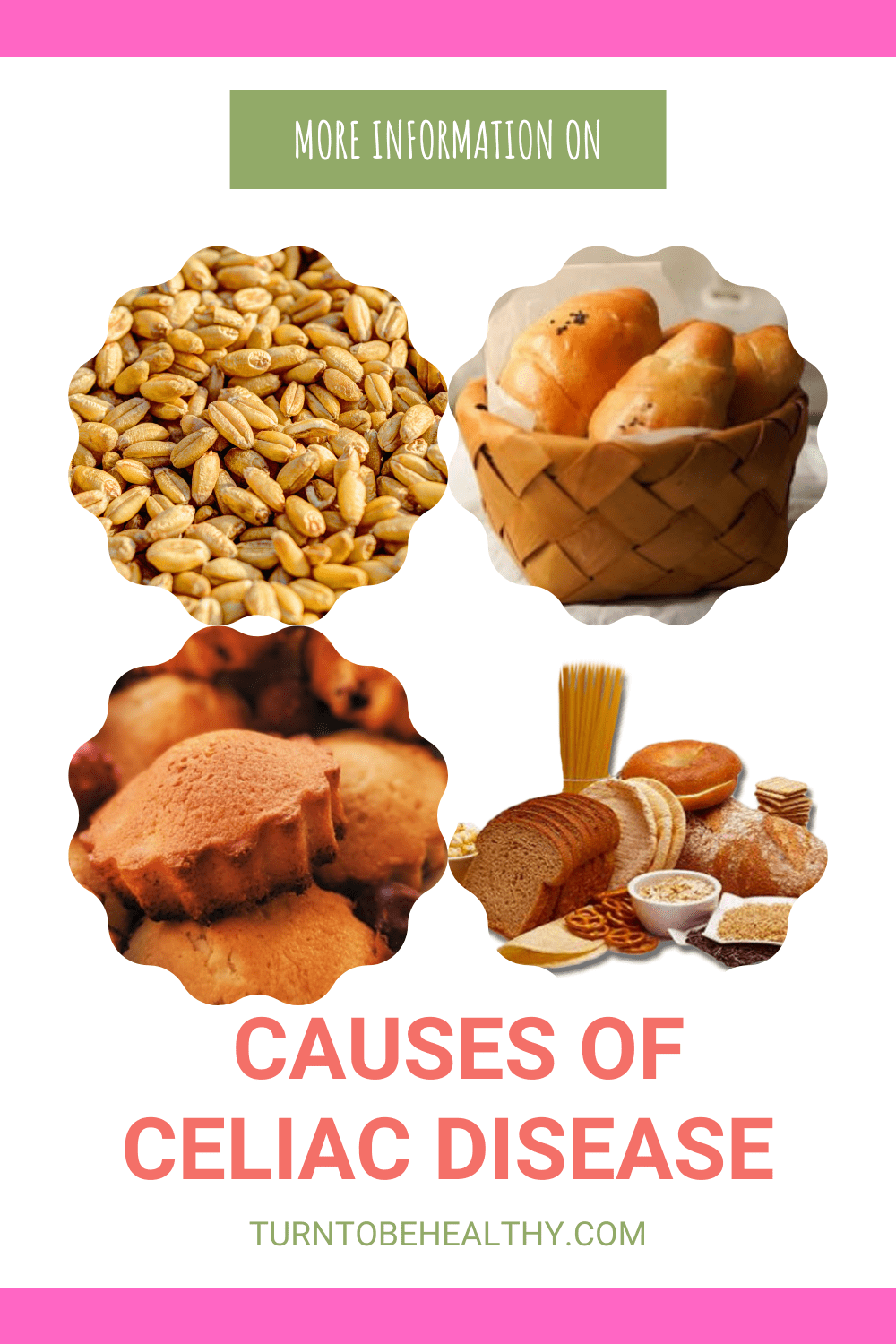
There is not much data to pinpoint the exact cause of celiac disease. There was a significant achievement in the celiac disease research history by the scientific community. It happens when they identify the tissue transglutaminase as the autoantigen. That confirmed the autoimmune nature of this disorder. A genetic background (HLA-DQ2/DQ8 positivity and non-HLA genes) is a critical determinant of the growth of the disease, which happens with the assistance of environmental factors (e.g., viral infections and dysbiosis of gut microbiota).
Celiac disease can transpire at any age and any time with any combination of symptoms and or manifestations.
Studies have revealed that most celiac disease issues are hidden in the absence of serological screening due to heterogeneous symptoms and or inadequate understanding of the celiac disease. Celiac disease prevalence is advancing in Western countries at an alarming rate. Between 1975 and 2000, celiac disease prevalence increased about 5-fold in the US, for reasons scientists don’t know.
The vast challenges include acquiring a more helpful knowledge of still-unclear phenotypes.
Such as:
- Slow-responsive
- Potential (minimal lesions)
- Seronegative celiac disease.
Symptoms of Celiac Disease
Many people with celiac disease may or may not have the symptoms or most symptoms. The celiac disease symptoms differ from person to person, relying on many factors such as duration, age someone started eating gluten,
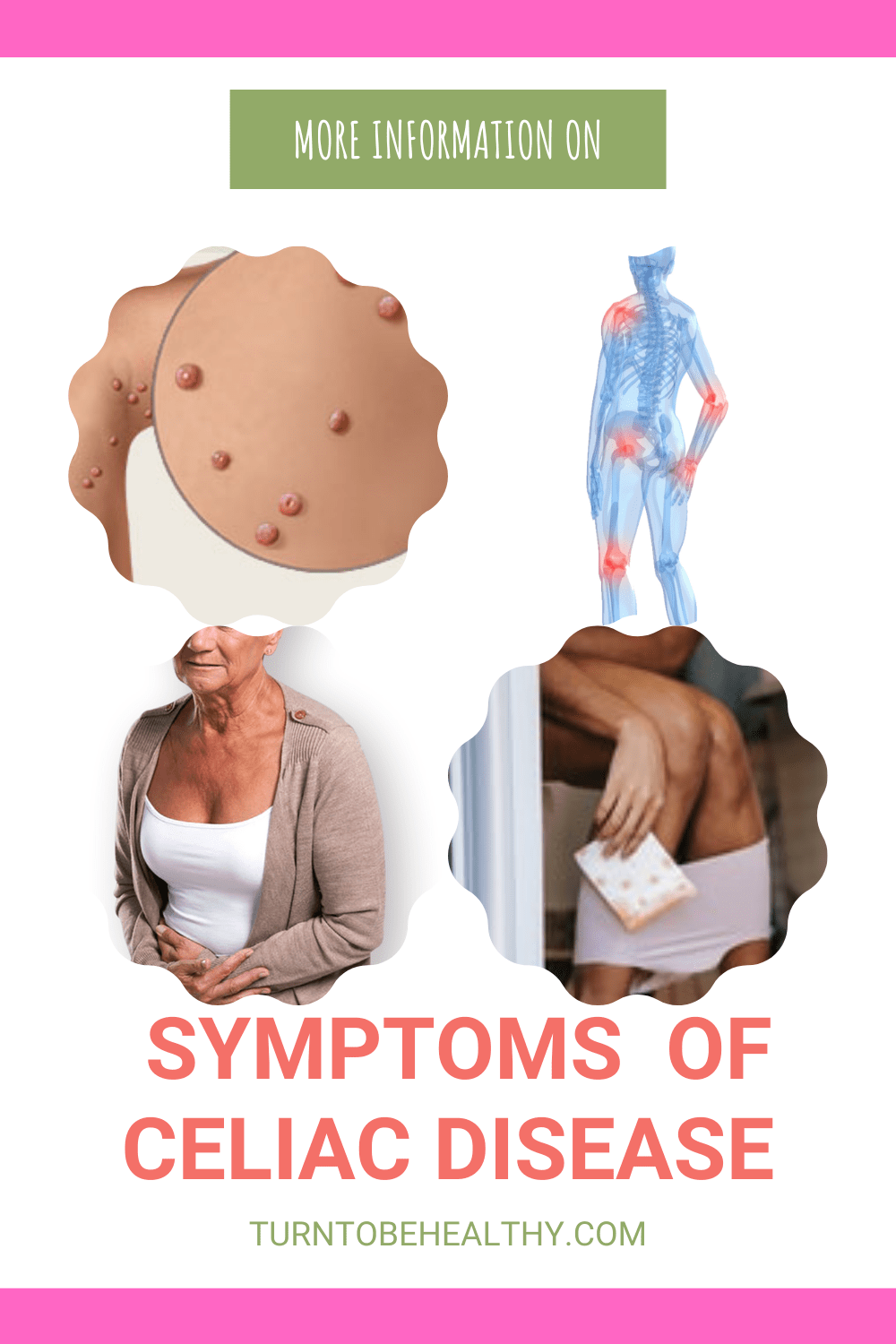
and amount of gluten ingested, etc.
There are many symptoms and signs of celiac disease, and can bring to many different health issues, including the
following:
- Diarrhea
- Loose, greasy, bulky, and bad-smelling stools
- Constipation
- Weight loss
- Fatigue or Tiredness
- Gas or Bloating
- Mouth ulcers
- Nausea
- Vomiting
- Ameliorating
- Abdominal pain
- Lymphoma
- Cramps
- Joint pain
- Itchy Rash
- Delayed growth in children
Celiac disease may also be impaired in the concentration of amino acids in their blood and declined cognitive abilities. A minority also has an unexpected bleeding disorder.
Serious Complications of Celiac Disease
Celiac Disease affects 1 in 133 people globally, with higher rates in North America at 1 in 22 people. Uncontrolled Celiac disease is the most common genetic disorder globally and, if left untreated, can lead to complications, including death.
Certain people with celiac disease do not show symptoms but still develop long-term complications. Celiac disease patients develop several varied complications when not treating celiac disease.
Several complications can occur with celiac disease. Here are some examples:
- Severe malnutrition from malabsorption of nutrients
- Iron deficiency
- Nerve damage
- Gastrointestinal
- Infertility in men and women
- Extraintestinal
- Poor development or growth of children with celiac disease
- Abdominal pain
- Seronegative
- Diarrhea, weight loss
- Intestinal lymphomas
- Neurological problems such as depression and anxiety
- Osteoporosis due to the lack of calcium and vitamin D absorption
- Dermatitis herpetiformis
- Non-responsive and refractory.
Complications during pregnancy include the following:
- Miscarriage or stillbirths in women who have not been diagnosed with celiac disease before pregnancy.
- Complications during childbirth, i.e., difficulty delivering a child, because damage to the maternal intestines is terrible, so they can no longer push the baby out.
There is also an increased risk for other autoimmune disorders, including thyroiditis, type 1 diabetes, Addison’s disease, and rheumatoid arthritis.
Studies have also shown that patients with celiac disease are at a higher risk for some forms of cancer, such as intestinal lymphomas (1.4x increased risk), non-Hodgkin’s Lymphoma (3.2x), and adenocarcinomas of the gastrointestinal tract (3.7x).
The celiac disease complications are numerous but most definitively include malnutrition from malabsorption of nutrients caused by damage to the intestinal tract. It is essential to get diagnosed with celiac disease and follow a gluten-free diet to prevent these complications.
An appointment needs to be scheduled with your doctor if you suspect celiac disease and see what they recommend for diagnosis or treatment. Delaying diagnosis or treatment can lead to numerous amount of complications.
Hypothyroidism and Celiac Disease Symptoms
People with the celiac disease sometimes have different symptoms from those with hyperthyroidism or hypothyroidism. Hyperthyroidism is when the thyroid gland generates extra thyroid hormonal agents than your body needs. The thyroid is a tiny, butterfly-shaped gland in the front of your neck. Thyroid hormonal agents control the way the body uses energy, so they affect nearly everybody organ in your body, even the way your heartbeats. Many of your body’s features speed up with too much thyroid hormonal agent.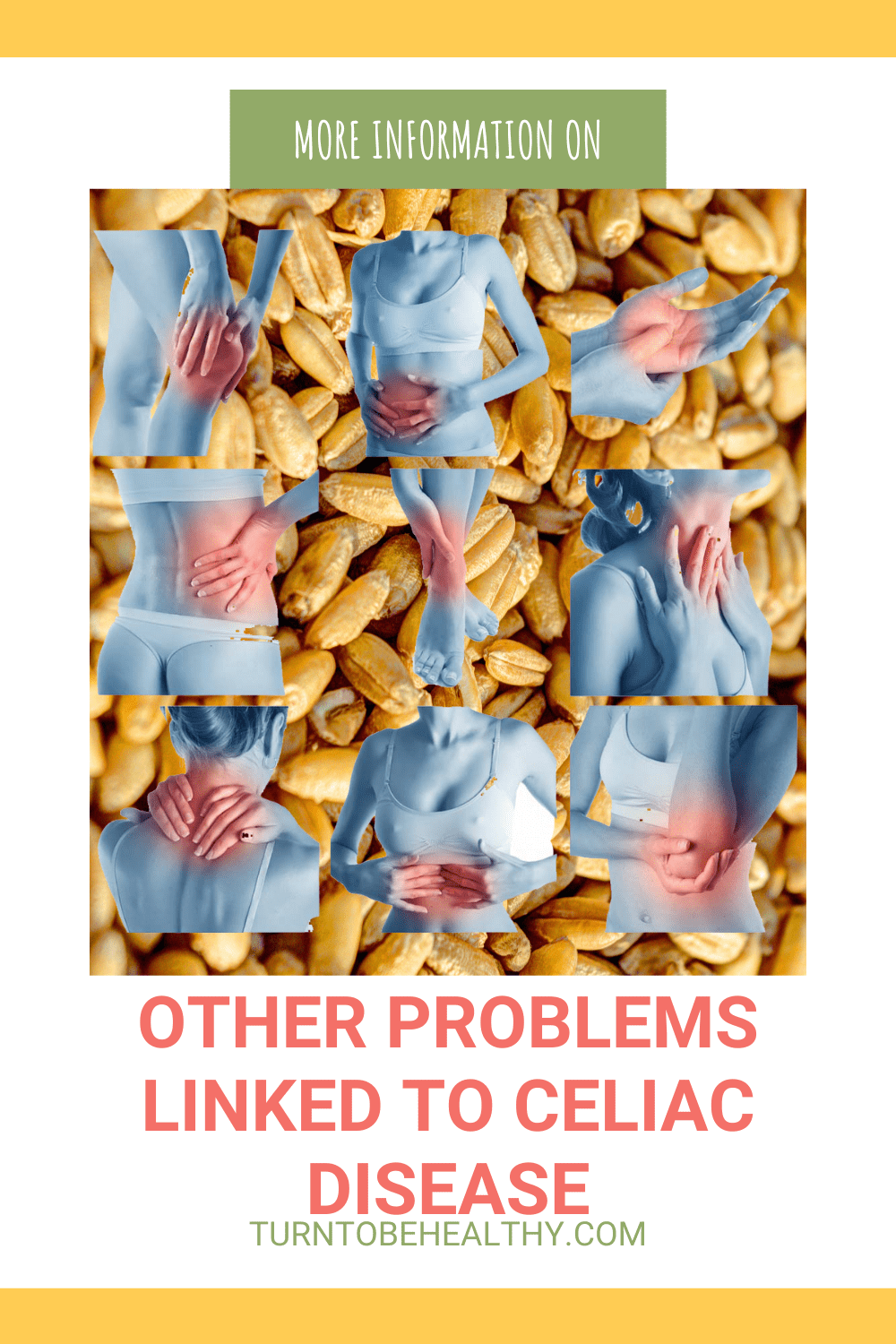
Thyroid dysfunction in celiac disease can manifest with nonspecific symptoms of hypothyroidism, such as weight gain, lethargy, and hair loss. Celiac disease can cause overactivity of the parathyroid glands in your neck, causing them to secrete more than average amounts of parathyroid hormone.
Hyperthyroidism and hypothyroidism are medical conditions. They both affect the amount of thyroid hormone produced and released by your thyroid. The important part is that one is the opposite of the other concerning each makes.
The prefix “hypo-” in medicine means “low” or “insufficient.” Hypothyroidism is when your thyroid gland becomes underactive and produces or releases less thyroid hormone.
Hyperthyroidism is when your thyroid gland becomes overactive and produces excessive thyroid hormone. Either of the two might hinder your body from functioning correctly.
Some symptoms for hyperthyroidism or hypothyroidism are as follows:
- Diarrhea
- Elevated appetite
- Despite an increased appetite, you can lose weight
- Muscle weakness
- Difficulty sleeping
- Restlessness
- Palpitations
- Nerve problems
- Shaking hands
- Bulging eyes
- Excessive sweating
- Some skin issues
- Blurry vision
- A goiter is a type of neck enlargement
The symptoms of hyperthyroidism or hypothyroidism often come and go.
Gluten Intolerance, Celiac Disease, or a Wheat Allergy?
It affects the small intestine, and it’s possible to be diagnosed with celiac without having any symptoms of gluten intolerance. Gluten intolerance might mainly generate identical symptoms to celiac disease. There are a lot of similarities between the symptoms of gluten intolerance and that of celiac disease. Both have the exact cause, the protein found in rye, barley, and wheat.
You might find yourself not sure what you have, but it’s been tough to eat without feeling sick for a certain amount of days. Your stomach hurts, the feeling in your tongue is sore, and sometimes there is blood in your stool. Once you start eating food containing gluten, these symptoms get worse. It would be best to highlight all of what is happening to your medical practitioner.
Your medical doctor will send you for some tests to get the best information on what is happening to your small intestine. Symptoms alone cannot direct you on what you have amongst the celiac-related diseases.
Gluten-sensitive Enteropathy
Does chronic diarrhea characterize a condition with or without abdominal pain in which wheat gluten is the suspected cause of intestinal damage that results in impaired absorption of nutrients with or without skin manifestations?
Gluten-sensitive enteropathy is a chronic inflammatory disorder of the small intestine, manifested clinically by jejunal atrophy. In many people with gluten-sensitive enteropathy, symptoms resolve when their diet excludes wheat and related cereals.
Patients with gluten-sensitive enteropathy were found to have an increased risk for hospitalization due to other causes, such as gastrointestinal bleeding.
Unusual or Weird Symptoms and Other Problems Linked to Celiac Disease
When patients with celiac disease ingest foods containing gluten, the lining of their small intestine becomes damaged. Over a while, this causes insufficient absorption of nutrients from food and can lead to weight loss, anemia, and vitamin deficiencies.
Celiac disease is a sickness in which the small intestine cannot take gluten from wheat or other grains that contain it. 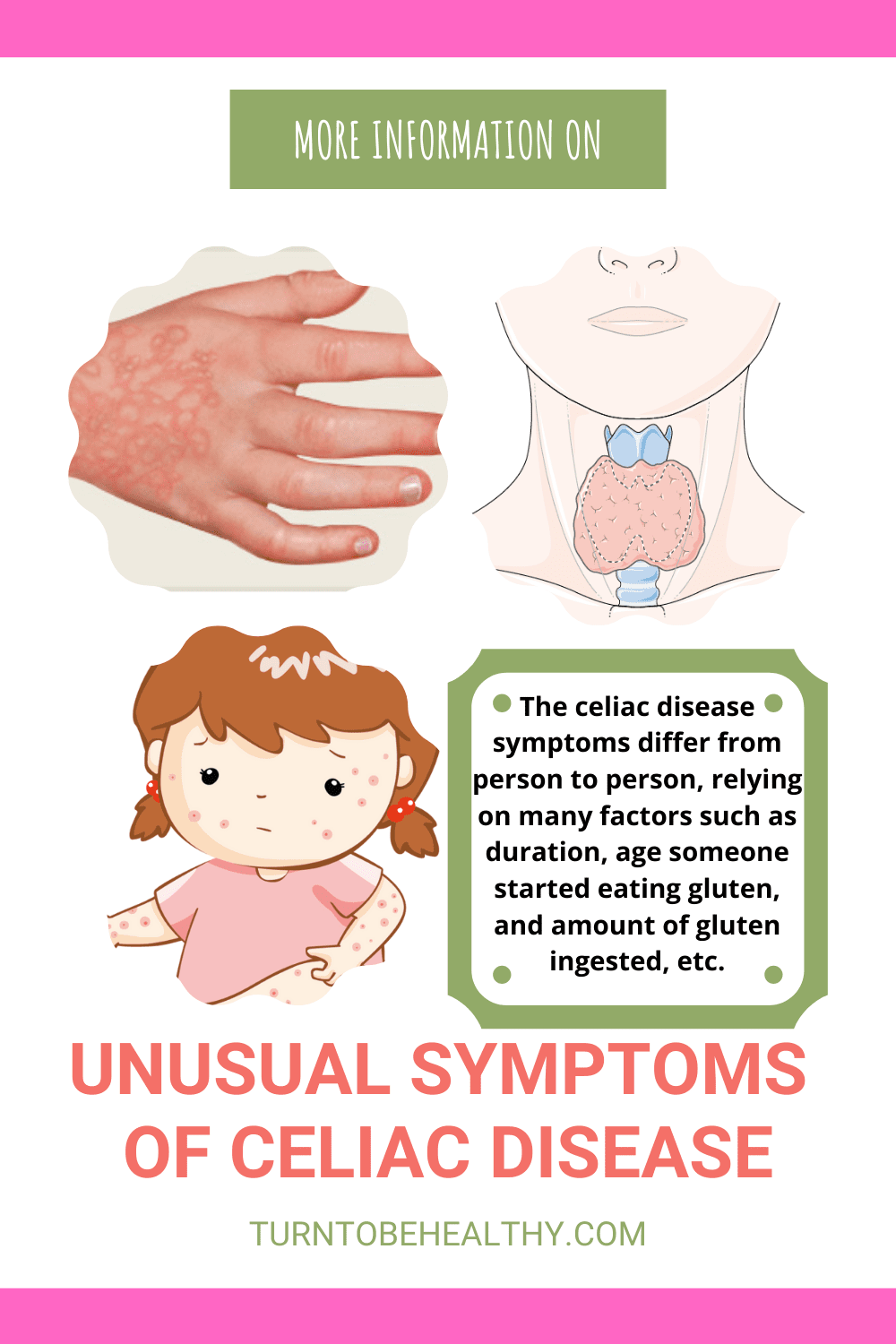 The condition can also cause other unusual or weird autoimmune conditions such as:
The condition can also cause other unusual or weird autoimmune conditions such as:
- Thyroid disease
- Type 1 diabetes
- Peripheral neuropathy celiac disease
- Dental defects
- Various skin disorders
- Blistering
- Diarrhea
- Malabsorption
- Infertility
- Dermatitis herpetiformis
- Peeling of the skin
- Low estrogen levels
- Too much sweating
- Miscarriage because this condition can cause irregular ovulation cycles.
- Irregular menstrual periods are also another symptom that people may experience in celiac patients.
- Hypersensitivity: This is when a condition in which the immune system overreacts to a specific antigen, resulting in increased inflammation and injury such as swelling or redness that is often visible.
This article here goes even further in explaining the complications and risk factors of celiac disease if you understand that this disease, for the most part, occurs because of the closeness of quality against the gluten protein.
YouTube Video for Unusual Symptoms of Celiac Disease:
Dermatitis Herpetiformis
Usually, the cause of dermatitis herpetiformis is too much deposit of immunoglobulin A in the skin. It usually initiates additional immunologic responses that result in lesion formation. It is an external representation of an abnormal immune response to gluten, in which IgA antibodies form against the skin antigen epidermal transglutaminase.
Dermatitis herpetiformis is an extremely itchy skin disease. It generally causes bunches of small bumps, burning skin rash, and blisters. The most common areas for these symptoms appear on the back, hairline, elbows, shoulders, scalp, knees, buttocks, and back of the head or neck. Symptoms typically can affect anyone at any age.
The symptoms differ from person to person. Here are the most common symptoms for dermatitis herpetiformis:
- Severe burning and itching skin
- Clusters of itchy areas
- Small bumps and blisters on the skin
- Erosions and scratches are commonly on the skin
The symptoms of dermatitis herpetiformis sometimes might seem like many other skin conditions, pemphigoid, or scabies, irritant or allergic contact dermatitis, such as atopic dermatitis, psoriasis. It is always best to talk to a healthcare provider for excellent pieces of advice on your next steps.
The same allergy to gluten may also be in the gut, known as celiac disease. You can have both dermatitis herpetiformis and celiac. In certain instances, celiac patience finds themselves having cancer. With this in mind, as a celiac patient, it’s crucial to see a medical doctor who primarily specializes in issues related to the stomach and intestines.
Interesting Facts about Celiac Disease
A study done in 1984 concluded that about 4% of the population has celiac disease, while more recent estimates range between 0.5% and 1%.
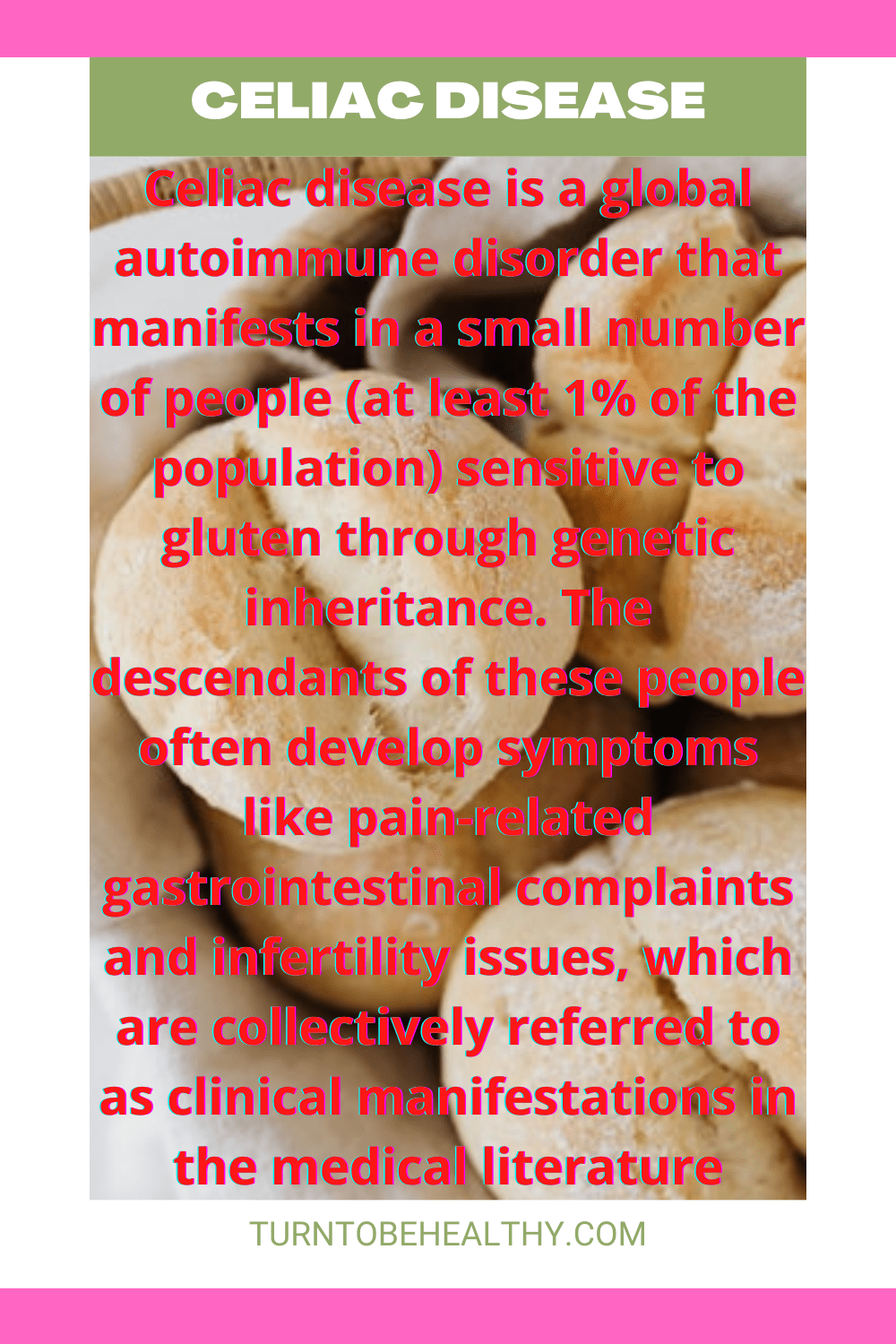 People with celiac disease can eat foods that contain gluten, but it is essential to be careful about the amount of these foods they consume because they can cause other health problems.
People with celiac disease can eat foods that contain gluten, but it is essential to be careful about the amount of these foods they consume because they can cause other health problems.
Celiac disease is a global autoimmune disorder that manifests in a small number of people (at least 1%) sensitive to gluten through genetic inheritance. The descendants of these people often develop symptoms like pain-related gastrointestinal complaints and infertility issues, which are collectively referred to as clinical manifestations in the medical literature.
Cow’s milk and other products containing gluten are a source of lifelong problems. The type and severity are dependent upon the hosts’ quantity and sensitivity. Expanding awareness about gluten can only raise knowledge about celiac disease.
In 2015, there were 1 in 133 people with celiac disease.
Celiac disease affects nearly 2 million Americans, and the number is growing.
The highest incidence of the condition was found among first-generation immigrants from countries with high wheat consumption, but it can affect anyone.
Interestingly, celiac disease can also cause neurological problems like ataxia and seizures. There may be a connection between celiac disease and type 2 diabetes mellitus.
A new phase 2 clinical trial that uses technology developed at Northwestern Medicine shows that it can induce immune tolerance to gluten in patients with celiac disease. These discoveries may pave the way for treated celiac patients to endure gluten in their diet ultimately.
After treating a few patients with the new technology, those patients could eat gluten with a considerable decrease in inflammation. The outcomes also indicate a promising trend toward saving patients’ small intestines from gluten exposure. We hope the study will finally be groundbreaking in the fight against celiac disease.
Celiac Disease Treatment
Currently, there is no specified cure or treatment for celiac disease. The only “so-called” treatment is to follow a

gluten-free diet. You need to consult your medical doctors to get advice for the treatment of celiac disease. Celiac disease and non-celiac gluten sensitivity treatment is lifelong devotion to a stringent gluten-free diet. Only on some few people food and beverage containing gluten with less than 20 parts per million (ppm) it sometimes not triggering the immune system to damage your villi.
Celiac disease is known to be an autoimmune disease, so you cannot “outgrow” it.
The gluten-free diet heals your small intestine villi, causing symptoms to get better. Once the symptoms get better, your villi heal, and they start to absorb nutrients correctly. Following the gluten-free diet also helps prevent severe complications because your body gets all the vitamins and nutrients it needs.
Before starting the process or treating celiac disease, you must consult your medical doctor to get health advice on avoiding gluten while following a nutritious and healthy diet. Your doctor will work for hand in hand with a dietician specializing in treating individuals with celiac disease to obtain the best diet tailored to your needs.
Some people mostly notice symptoms improve within days to weeks of starting the diet, and some it takes months before seeing any improvements.
Dietitian will guide you through avoiding gluten while following a healthy diet and recommend substitutes for foods containing gluten. The dietitian has vast knowledge in the following:
- They will design your daily meal plans, including snacks.
- They will assist you in understanding food containing gluten and its labeling because there are many places where gluten is hiding in plain sight.
- They will assist with beverages and drinks that will best serve you.
You will need to be careful in everything you ingest because even your supplement might contain gluten. You need to inform even your pharmacist about your situation because you might require the following due to the insufficient absorption of your small intestine:
- Vitamin and minerals
- Nutritional supplements
- Over the counter medications
- Herbal supplements
Those medicines containing gluten should be in small quantities and usually won’t trigger any symptoms. That is why it is crucial to discuss and or inform your doctor about anything if it is not prescribed. The important note is never to assume if a product is gluten-free or not. Always be 100% sure of what is in your diet.
Even if you are a celiac patient, you can still consume a healthy diet. For example, drinking some dairy products, bread, and pasta manufactured or produced from alternative types of flour (such as potato, rice, corn, or soy) are accessible. Many grocery stores, as well as food companies, offer gluten-free bread and other gluten-free foods.
Living a Gluten-Free Lifestyle
Living a gluten-free lifestyle ensures that you eliminate the entire food products containing gluten in them. It is a relative of proteins in wheat, barley, rye, etc.
If you intend to go gluten-free, it’s crucial to understand that it might set you up for some nutritional deficiencies. Celiac disease patient needs to consider a gluten-free multivitamin-multimineral supplement; it is a good idea for anyone trying to avoid gluten.
Get advice from a professional like medical doctor or dietitian, it is best to get tested for celiac disease before trying a gluten-free diet. Otherwise, it will become hard for your doctor to tell if you have celiac disease or not.
To ensure that your small intestine heals completely, you need to follow a strict gluten-free diet for weeks or months. Before starting to consume gluten again, seek assistance from a medical doctor or dietitian.
You’ll need to do some tests before reintroducing your normal foods containing gluten into your diet.
If a gluten-free diet doesn’t help your symptoms, something else is likely causing your digestive problems.
Role of Endoscopy in Diagnosis
The medical doctors usually recommend endoscopy, biopsy, and blood test to confirm if a patient got celiac disease or not. The procedure allows medical doctors to identify any symptoms, inflammation, and damages to your small intestines, which is a sign of celiac disease. The test patient must be on a gluten-containing diet for the endoscopy to be accurate.
If the results came back positive, it means you have celiac disease. If the results come back negative, it means you don’t have celiac disease.
Celiac Disease Long-Term Effects

The untreated celiac disease turns to more damage to your body and immune system. Here are some of the celiac
disease long term effects:
- Gastrointestinal issues
- Lactose intolerance
- Vitamin deficiency
- Mineral deficiency
- Osteoporosis
- Iron deficiency
- Infertility
- Miscarriage
- Cancer
- Problems with the nervous system
- Crohn’s disease
- Skin rash
In this following article, we further explain whether the celiac disease can cause cancer or not. You might need to read it to get a complete insight into the disease possibilities.
Refractory celiac disease and sprue-like intestinal disease
Refractory celiac disease is a condition that occurs in some people with celiac disease but may also occur without the diagnosis of celiac. It is called refractory celiac disease in the early stages of celiac disease.
Refractoriness in celiac disease can sometimes be due to poor diet adherence, called “the gluten challenge.” The cause and significance are unknown, as well as the treatments. It is a condition where the body becomes resistant to treatment, food intake is limited because of difficulty swallowing, and malnutrition becomes more severe.
The current idea of celiac disease is an autoimmune disorder where the body attacks itself. A person with this condition experiences chronic inflammation in their small intestine.
Occasionally, the tiny bowel biopsy differences do not appear to get better despite apparently good adherence to a gluten-free diet. Ongoing symptoms and changes in the small bowel biopsies are present. Although a moderately treatment-resistant form of celiac disease could be recent, maybe with a distal little bowel diet reaction, celiac disease may not be present at all. Instead of identifying these patients with refractory celiac disease, additional specific terms have been historically used, including “sprue-like intestinal disease” or “unclassified sprue.”
Lymphoma Types in Celiac Disease
There are many different types of lymphomas, which also have their subtypes. These lymphomas have two categories which are fast-growing and slow-growing; some have sub-types that fall between the two categories. Some of the most common lymphomas are:
their subtypes. These lymphomas have two categories which are fast-growing and slow-growing; some have sub-types that fall between the two categories. Some of the most common lymphomas are:
Non-Hodgkin lymphoma has more than 30 sub-types that have slow-growing and fast-growing.
Burkitt lymphoma is believed to be the fastest-growing amongst all the lymphoma.
Lymphoma and leukemia share a familiar source—lymphocytes, the white blood cells originating from the bone marrow. It is mainly considered a slow-growing form.
B-cell lymphoma is one of the most typical non-Hodgkin lymphoma in the United States. It isn’t very aggressive and spreads quickly.
T-cell lymphoma is a natural killer cell lymphoma or NK cell lymphoma, and it is the most highly aggressive or fast-growing.
Dental defects in Celiac Disease
The bloodstream then becomes overloaded with calcium, leading to other problems. The reason for this is not
apparent, but it may be due to the body’s attempts at trying to get more calcium because of low blood levels.
Expect are saying digestive starts in your mouth, thus making your teeth an essential part of your digestive system.

Tooth faults due to celiac disease sometimes resemble those caused by having too much maternal or fluoride or early childhood illness. These tooth issues are primarily due to nutritional deficiencies. The dental enamel deficiencies are also relatives to those diagnosed with celiac disease but who haven’t been diagnosed with the dental condition.
Here are some of the issues related to dental defects in Celiac Disease:
- Tooth discoloration
- Enamel issues
- Poor teeth development
- Banding teeth
- Cavities
- Mottled or translucent-looking teeth
- Dry mouth
- Mouth sore
- Atrophic glossitis
Tooth faults that result from celiac disease are permanent, and improvement is difficult even after adopting a gluten-free diet. Usually, dentists use bonding and other cosmetic solutions to cover your dental enamel issues.
Most Frequently asked Question about Celiac Disease
What are early warning signs of celiac disease?
Most people with celiac disease have no signs and symptoms, and if it happens, the are many symptoms that can present themselves. It is crucial to know that this is not a self-diagnosed disease amongst many autoimmune disorders.
Here are a few symptoms that might surface:
- Bloating
- Chronic abdominal pain
- Vitamins and nutrients deficiency
- Diarrhea and or constipation
- Sometimes the shape, and smell of your stool
- Brain fatigue
- Headaches
What causes celiac disease in children?
The leading cause of the celiac disease is unknown.
The known part is that it is a primarily hereditary or genetic-related disease.
Secondly, it is an autoimmune inflammatory disease of the small intestine triggered mainly by ingesting gluten-related food. It is a protein mostly in wheat, barley, rye, and barley.
How common is celiac disease?
It is a not so common disease, but the number is growing at an alarming rate. Many people have celiac disease but have not been diagnosed. However, experts estimate about 2 million people in the United States have celiac disease, and about 1 percent of the worldwide population has celiac disease.
What are the long-term effects of celiac disease?
The untreated celiac disease turns to more damage to your body and immune system. Here are some of the celiac disease long term effects:
- Gastrointestinal issues
- Lactose intolerance
- Vitamin deficiency
- Mineral deficiency
- Osteoporosis
- Iron deficiency
- Infertility
- Miscarriage
- Cancer
- Problems with the nervous system
- Crohn’s disease
- Skin rash
What are the recommended blood tests to diagnose celiac disease?
A blood test is usually the first test to see if you got a celiac disease or not. There are currently two blood tests that health practitioners recommend generally:
- Serologic tests, which checks for antibodies
- A genetic test, which checks for genetic variants
How accurate are the celiac blood tests?
They are not 100% accurate. The blood tests are reliable most of the time, except they give false results in fewer instances.
Are the villi permanently damaged in a patient with celiac disease and how long does it take for the villi to return to normal?
No, they are not permanently damaged. Only in fewer instances where you had a long-term effect, and your small intestine ended up having holes. You’ll only permanently damage a particular part of your small intestine.
Your villi usually heal between 3 and 6 months if you follow a strict gluten-free diet supported by your medical doctor and dietician.
Is it necessary to have an intestinal biopsy to confirm the diagnosis of celiac disease?
It is not always necessary, except when the blood test was not giving a clear indication or the health practitioner needed to be sure about something.
Why does celiac disease causes so many different types of symptoms and potentially serious complications?
Our scientists currently don’t understand why gluten makes the immune system attack your lining in the small intestine. Celiac causes severe damage and issues that can go beyond the digestive system.
The most common is malnutrition when your small intestine fails to absorb enough nutrients.
Your body goes to minerals and nutrients deficiency, where your immune system becomes weaker daily and eventually collapse. All disease gets a chance to do whatever in your body.
Can celiac cause kidney damage?
Yes, celiac disease can cause kidney disease. There are several reports for various types of kidney disease in patients with celiac disease. This including:
- Diabetes IgA nephropathy
- Membranous nephropathy
- Membranoproliferative glomerulonephritis
- Nephropathy
- Oxalate nephropathy
- Nephrotic syndrome related to malabsorption
Conclusion
Living with celiac disease can be difficult. The condition’s complications vary from person to person and may range in severity depending on whether or not a treatment is initiated or not for it. The treatment helps people manage their symptoms and live healthier life by following a gluten-free diet! If you’re curious about how living without gluten might affect your life long term, then click here to read our blog post all about what health problems celiac disease can cause. We hope this information has been helpful; please don’t hesitate to reach out to us if you have any questions.
